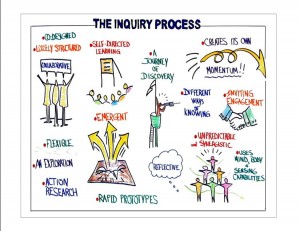Using Inquiry to Explore the Emerging Work of the Whidbey Institute 2004
What
In 2004 the Whidbey Institute was re-framing its programmatic contribution to the human system ecology of the Cascadia bio-region. “We are poised on the threshold between what is no longer adequate and what we cannot yet imagine. These conditions call us to re-align our work in three interconnected initiatives.” The “Green Initiative” (not yet fully named then) sought to both re-imagine and re-language the environmental challenge in an interdependent and polarized world. A specific programmatic “name” was withheld in order to re-inspire a deep identification with the web of all life—a cherished value of the Institute. A new story, a new language, was needed. The Institute’s programs and learning opportunities would eventually serve the emergence of this new story, grounded in the best science and in the sacred knowledge of human participation from diverse perspectives. We were engaged to design and hold a Collaborative Inquiry space with participants coming from the environmental, scientific, academic, spiritual and local community arenas. Our focus was re-imagining, re-framing and re-languaging the role and contribution of the Whidbey Institute.
How
A Collaborative Inquiry is a 2 ½-3 day gathering of people to mutually explore an issue or a “burning question.” It is an exploration, a journey of discovery. Participants work together in a spirit of openness and engagement. The Inquiry draws on the wisdom and unique perspective of every participant, to deepen and expand the collective understanding of a profound question or issue brought by participants or the conveners of the Inquiry. It has the qualities of an intimate setting, inviting full self expression and engagement.
The Inquiry design for the Whidbey Institute included music, art and movement along with dialogue. We used multiple modalities to be at our edges of thinking and to nourish the dynamic tension that can accompany a shift in one’s mindset and perspective. The inquiry space offered a genuine opportunity to co-design and share in a self-directed learning and emergent process exploring what the world was calling for in the “Green Initiative”. Cross-fertilization across disciplines was instrumental in the participants’ deep exploration of climatic change and other key ecological challenges in the context of environmental activism, renewal and spiritual awakening to manifest change and transformation.
Impact
This inquiry created a safe space for participants to deeply explore the “whole person” impacts—emotional and spiritual—of the environmental issues that challenge us as humans and as a species. The palpable resultant, as we came to closure, was the utter need for personal renewal for people intimately involved in the front lines of scientific research, environmental activism, policy generation and awareness building and education. The Inquiry did not necessarily “name” the programmatic contributions of a “Green Initiative” but rather it confirmed the sacred space for renewal provided by the Chinook lands and the Institute’s sense of place.

